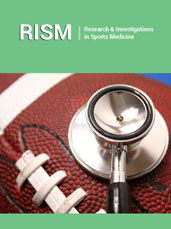- Submissions

Abstract
Research & Investigations in Sports Medicine
Attitudes and Moods among Athletic Trainers Following Suspension of 2020 Athletic Season Due to COVID-19
-
Open or CloseS Andrew C1,2*, Brandon W2,3, David M3, Warner L4, Diana G1, Laurel T5, Christina T6 and Julie G7
1University of Texas at Tyler, USA
2University of North Carolina, Greensboro, USA
3Grand Canyon University, USA
4MVP Orthopedics, USA
5Christus Trinity Mother Frances, USA
6The University of Texas Health Science Center, USA
7Collin College, USA
*Corresponding author:Cage SA, University of Texas at Tyler, University of North Carolina, USA
Submission: May 08, 2020;Published: June 02, 2020

ISSN: 2577-1914 Volume6 Issue3
Abstract
Following the global spread of severe acute respiratory syndrome coronavirus 2 (SARS-CoV-2), the majority of colleges and high schools canceled all face-to-face courses and athletic activities. In response to these cancellations, the National Collegiate Athletics Association and National Junior College Athletics Association voted in favor of granting student-athletes who participated in spring sports and met certain criteria an extra year of eligibility. At this time, research is being conducted to evaluate the epidemiology, recognition, treatment and prevention of coronavirus disease 2019 (COVID-19), the disease associated with SARS-CoV-2. However, there does not appear to be any published research on the attitudes and motivations of the athletic trainers caring for student-athletes following the cancellations 2020 spring athletic and academic semesters. Therefore, the purpose of this pilot study is to describe the attitudes and moods of certified athletic trainers during the COVID-19 pandemic. A total of 284 certified athletic trainers participated in this study (age= 37 ± 11, certified experience = 13 ± 10). Participants were sent an electronic survey via email that collected demographic information and assessed attitudes and motivations regarding the shortened season and an extra year of eligibility. Data were downloaded and analyzed using a commercially available statistics package. The overwhelming majority of certified athletic trainers surveyed, in this study, were disappointed about the 2020 spring semester being shortened (Disappointed = 82.7%). Additionally, the mean scores on the PHQ-9 and GAD-7 indicated that on average athletic trainers are currently experiencing symptoms of mild depression and/or anxiety. These two questionnaires are screening tools, and as such should not be used as the only criteria for diagnosing depression and anxiety. However, these scores do indicate that many athletic trainers would benefit from advanced mental healthcare during the COVID-19 pandemic. These findings also suggest that the mental health of athletic trainers should be a consideration as schools begin to make determinations about returning to campus and athletic activities.
 a Creative Commons Attribution 4.0 International License. Based on a work at www.crimsonpublishers.com.
Best viewed in
a Creative Commons Attribution 4.0 International License. Based on a work at www.crimsonpublishers.com.
Best viewed in 







.jpg)






























 Editorial Board Registrations
Editorial Board Registrations Submit your Article
Submit your Article Refer a Friend
Refer a Friend Advertise With Us
Advertise With Us
.jpg)






.jpg)













.bmp)
.jpg)
.png)
.jpg)














.png)

.png)



.png)






